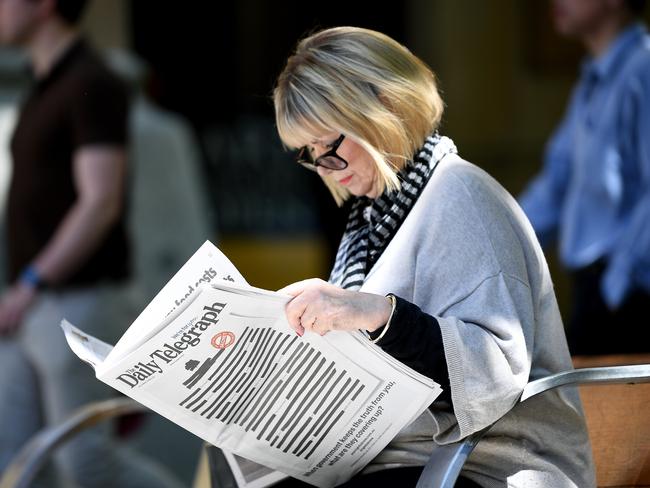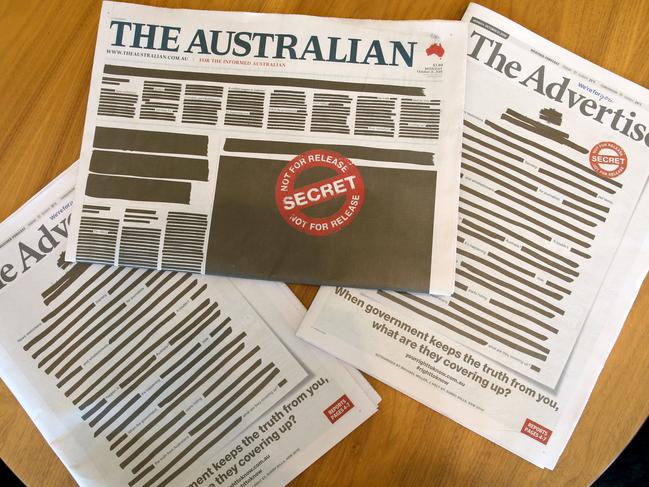Greater transparency needed and media must be beyond reproach
Governments at every level claim confidentiality for spurious reasons, frequently to prevent embarrassment. They thump the Top Secret stamp on every document that might reveal how stupid, wasteful or deceitful they are, writes Piers Akerman.

Opinion
Don't miss out on the headlines from Opinion. Followed categories will be added to My News.
- ‘Stop covering your arse and stand up for press freedom’
- We could power our country on a bonfire of vanities
Most intelligent Australians would be aware of the Right To Know campaign being run by the nation’s major media organisations.
Many may well think this is a self-indulgent operation and ignore it or mock it. They would not be alone.
Some of those now claiming to be champions of a free press — the ABC’s Barrie Cassidy, news.com.au’s Malcolm Farr and Karen Middleton of The Saturday Paper — laughed themselves silly when I alone on the ABC’s Insiders panel of March 17, 2013, spoke out against the Gillard Labor government’s proposal to install a government-appointed media regulator.
Why? Because Ms Gillard claimed the press (and she had The Australian in mind) had “questions to answer”.
To this date she has never told us what those questions may have been and she is now feted by the left as yet another victim of a misogynistic nation and given international platforms from which to spout her false claims about the country.

Freedom of the press has been a cause for which I have fought ever since I was first appointed as editor of The Advertiser in Adelaide in 1988.
After a notorious case in which a person whose name was suppressed had committed an offence which was not permitted to be disclosed in a town that could not be identified, I ran a campaign using the same tools as the current crusade.
Details in stories were blacked out and editorials were written.
Why was it important that the details be known? Because the case involved a doctor whose actions had killed a patient.
Freedom of press requires a balancing act which some activists choose to ignore. Julian Assange, for example, is not a journalist and deserves no protections or support for leaking confidential details which led to the names of undercover operatives fighting for liberal democratic principles being exposed and executed.
His is an extreme example of what should not win the sympathy of those arguing for a free press.

Today, we have blanket suppressions on the true state of aged care homes but fortunately we have a royal commission which is just starting to lift the veil covering some of the most revolting practices — perhaps still continuing — in aged care facilities.
This is why we need greater press freedom. We have suppression orders, still, preventing us knowing the names of doctors and nurses involved in terrible crimes against their charges.
We have the federal government claiming that important details of all contracts must be kept secret for reasons of commercial confidentiality.
The contract with the submarine builder, the former French company DCNS, which has a major historical problem with corruption charges, and has now rebranded itself as Naval Group, should be held up the light if for no other reason than the Defence Department has shown itself to be totally incapable of negotiating a meaningful contract which guarantees delivery on time and on budget.
Spending $50 billion on a submarine design yet to be decided, which may or not be diesel or nuclear and is supposed to be based on a nuclear model that is meant to be fit for service in the 2030s is beyond even Yes Minister.

And there are plenty of other examples. The media organisations are correct in arguing for greater transparency but they must themselves be beyond reproach.
Media organisations which also take it upon themselves to adopt virtue signalling causes should also consider whether they are not thereby promoting particular agendas — it’s OK in editorials and in columns but should be frowned upon at board level for the very obvious reasons of presenting a neutral face.
Governments at every level claim confidentiality for spurious reasons and it is no secret that they do most frequently to prevent embarrassment.
They thump the Top Secret stamp on every document that might reveal how stupid, how wasteful, how deceitful they are.
Unfortunately, too many so-called whistleblowers disclose information and want to claim immunity for their crimes of revealing material which may damage the national interest when they are really trying to exact revenge on departments or individuals whom they feel they can’t work with.
Yes, there are some genuine whistleblowers but not that many.
Balance is needed.
Better negotiating skills might bring it about but history shows that this is unlikely.
